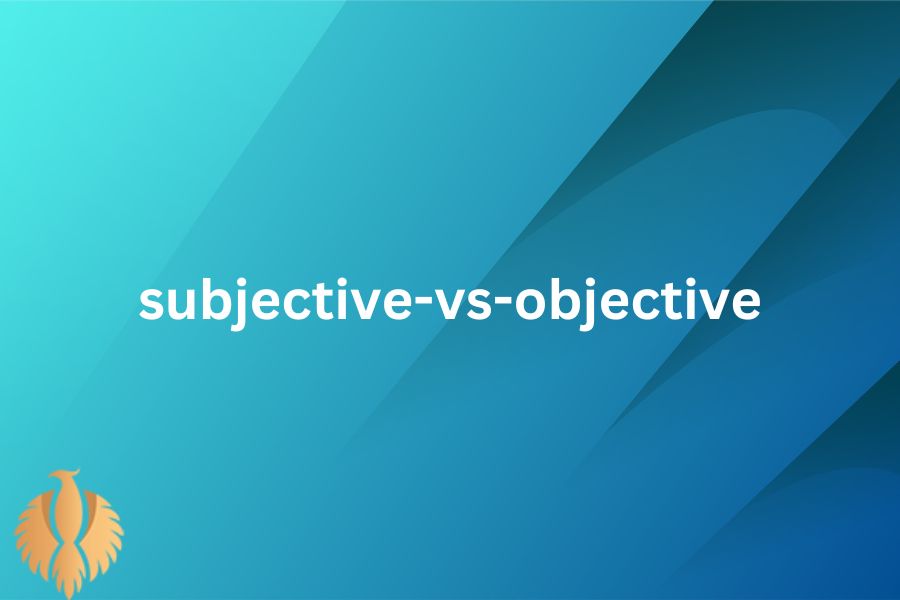In both everyday conversations and professional settings, we often encounter the terms “subjective” and “objective.”
Though they might seem straightforward, understanding the nuances between them is crucial for clear communication and critical thinking. Subjective and objective are two distinct approaches to understanding and evaluating information.
Subjective vs. Objective? Subjectives are based on personal opinions, feelings, and perspectives, making them inherently biased and influenced by individual experiences. An objective statement about the same movie might be “The movie has a runtime of 120 minutes.”
For example, saying “This movie is amazing” is a subjective statement because it reflects personal taste. On the other hand, objectives are grounded in factual, unbiased information that can be verified independently.
Understanding the difference between these two helps in distinguishing personal viewpoints from factual data, which is crucial for clear and effective communication.
Let’s explore these concepts in depth, looking at their differences, and providing some engaging examples.
What Are Subjectives and Objectives?
Subjectives and objectives are terms that describe different ways of approaching information, opinions, and evaluations.
- Subjective: This term relates to personal perspectives, feelings, opinions, and experiences. When something is subjective, it’s influenced by individual emotions and viewpoints. It’s inherently personal and can vary widely from one person to another.
- Objective: This term refers to information or judgments based on observable phenomena and facts. Objectivity aims for neutrality and impartiality, relying on verifiable evidence rather than personal feelings.
Let’s delve into these concepts more thoroughly, starting with some definitions and then moving to real-life examples.
Subjective vs. Objective: Definitions
- Subjective
- Definition: Based on or influenced by personal feelings, tastes, or opinions.
- Characteristics: Personalized, variable, opinion-based.
- Example: “Julia thinks that chocolate is the best ice cream flavor.”
- Objective
- Definition: Not influenced by personal feelings or opinions; based on observable and measurable facts.
- Characteristics: Impersonal, consistent, fact-based.
- Example: “The temperature is 72 degrees Fahrenheit.”
You might also enjoy: Roll Call vs Role Call: Spelling + Usage + Examples
;
Key Differences Between Subjective and Objective
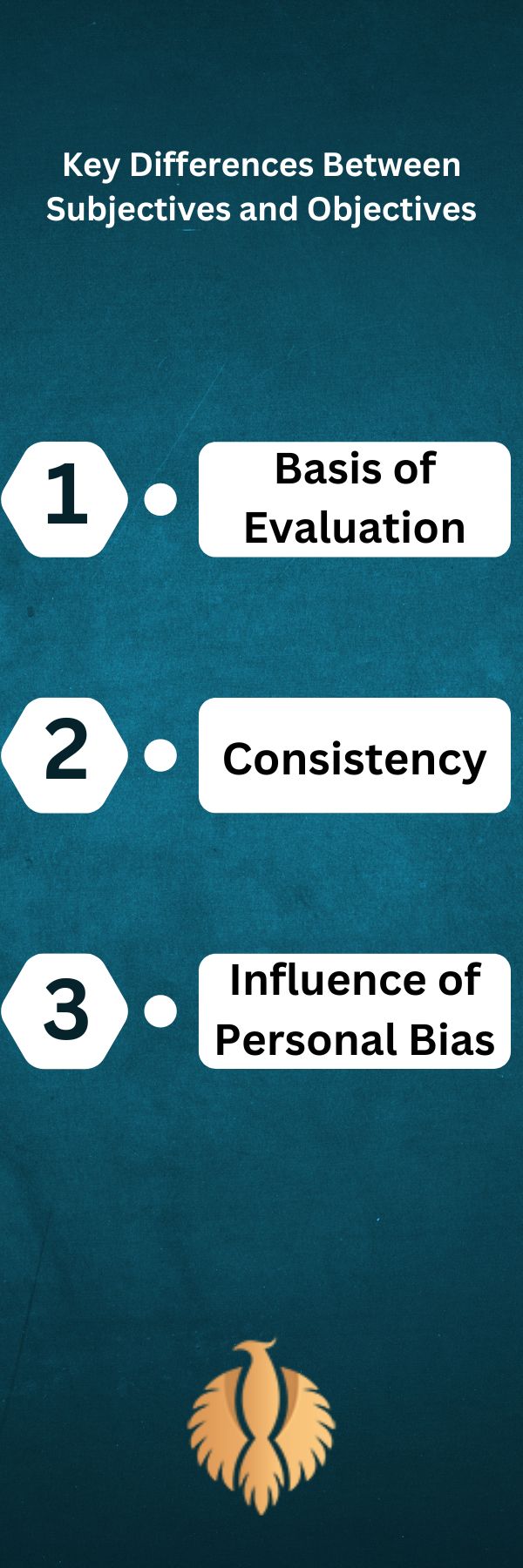
-
Basis of Evaluation
- Subjective: Evaluations are based on personal feelings or opinions. For instance, if I say, “Liam is the best cook in our group,” it’s subjective because it’s based on my personal experience and taste.
- Objective: Evaluations are based on measurable facts. For example, “Liam cooked a three-course meal last night” is objective because it can be verified through observation.
-
Consistency
- Subjective: Subjective statements can vary from person to person. What one person considers a great movie might not be the same for someone else. For instance, “The movie ‘Starry Night’ is the most thrilling film of the year” depends on individual taste.
- Objective: Objective statements are consistent and verifiable. For example, “The movie ‘Starry Night’ was released in 2024” is an objective fact.
-
Influence of Personal Bias
- Subjective: Subjective statements are often influenced by personal bias and perspective. For instance, “Anna is the most talented musician” reflects Anna’s individual merits as perceived by me.
- Objective: Objective statements are free from personal bias and based on data or universally agreed-upon facts. For example, “Anna plays the violin at a professional level” is a factual statement.
Examples to Illustrate Subjective and Objective
To make these differences more concrete, let’s look at some examples from various scenarios:
In Daily Life
- Subjective: “Ella’s home is the coziest place I’ve ever been.”
- This is subjective because it reflects my personal feelings about Ella’s home. What feels cozy to one person might not feel the same to another.
- Objective: “Ella’s home has three bedrooms and two bathrooms.” ️
- This is objective because it describes factual information that can be measured and verified.
In Education
- Subjective: “Mr. Thompson is the best teacher I’ve ever had.”
- This reflects my personal opinion based on my experiences with Mr. Thompson. Other students might have different opinions.
- Objective: “Mr. Thompson has a master’s degree in education and 15 years of teaching experience.”
- This is objective information that can be confirmed through educational records and professional history.
In Entertainment

- Subjective: “The new album by Juno is incredibly moving and the best of the year.”
- This is a subjective opinion based on personal taste and emotional response to the music.
- Objective: “Juno’s new album debuted at number one on the Billboard charts.”
- This is an objective fact that can be verified through music industry rankings.
In Food and Dining
- Subjective: “Sophie’s homemade lasagna is the most delicious meal I’ve ever tasted.”
- This is subjective as it’s based on personal taste preferences and experiences.
- Objective: “Sophie’s lasagna contains layers of pasta, cheese, and meat sauce.”
- This is objective because it describes the ingredients and structure of the dish.
You might also enjoy: When Do You Say Good Evening vs. Good Night?
How Subjective and Objective Statements Interact
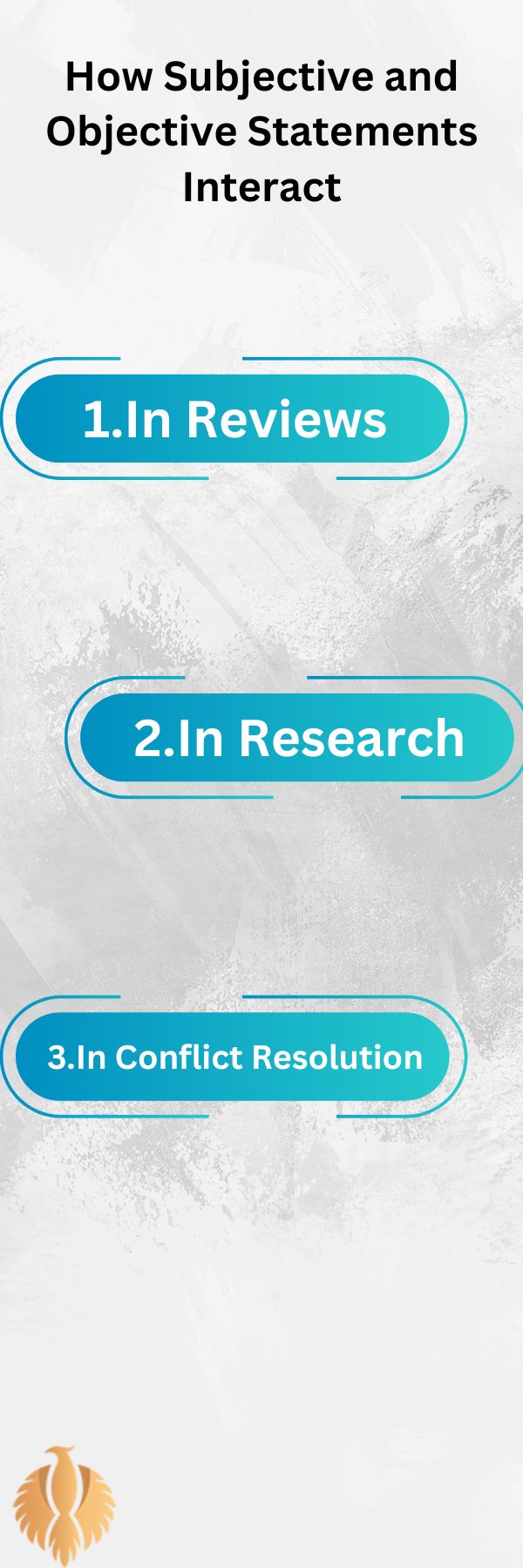
Understanding the interplay between subjective and objective statements is important in various contexts. Here’s how they can interact:
1. In Reviews
-
- Subjective: “The service at Café Delights is always friendly and welcoming.” ☕
- Objective: “Café Delights has a 4.5-star rating on review websites.”
Reviews often combine subjective impressions with objective data. The subjective statement reflects personal experiences, while the objective statement provides quantifiable data.
2. In Research
-
- Subjective: “I feel that the new software is more user-friendly.”
- Objective: “The new software reduced task completion time by 20% compared to the previous version.” ⏱️
In research, personal feelings and experiences are often reported as subjective observations, while data and results are presented objectively.
3. In Conflict Resolution
-
- Subjective: “Jamie feels that her contributions are not valued by the team.” ️
- Objective: “Jamie has contributed 30% of the total project hours.”
Understanding both subjective feelings and objective data helps in addressing issues and finding balanced solutions.
Practical Implications of Subjective and Objective Perspectives
Recognizing the difference between subjective and objective perspectives can have significant practical implications:
- In Decision-Making: Objective data can guide decisions based on facts, while subjective opinions can offer insights into personal experiences and preferences. For example, choosing a new software for a company might involve analyzing objective performance metrics and subjective user feedback.
- In Communication: Clear communication often requires distinguishing between subjective opinions and objective facts. For instance, when discussing a project’s success, it’s helpful to differentiate between the subjective feelings of team members and the objective results of the project.
- In Personal Relationships: Understanding the subjective and objective aspects of a situation can improve interpersonal relationships. Recognizing that someone’s feelings (subjective) are valid even if the facts (objective) might differ helps in empathetic communication. ️
Tips for Balancing Subjective and Objective Perspectives
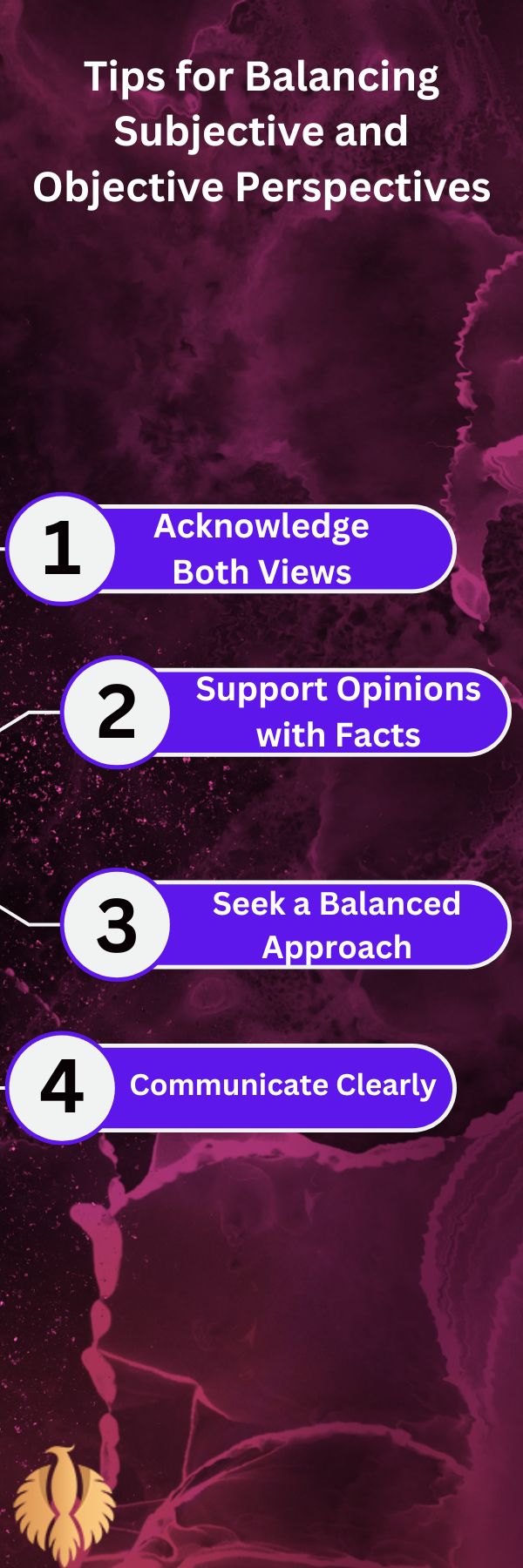
- Acknowledge Both Views: When discussing a topic, acknowledge both subjective experiences and objective facts to provide a well-rounded perspective.
- Support Opinions with Facts: When expressing subjective opinions, support them with objective data to strengthen your argument and provide context.
- Seek a Balanced Approach: In decision-making, balance subjective insights with objective data to make informed choices that consider both personal and factual elements.
- Communicate Clearly: Be clear about whether you’re sharing a subjective opinion or objective fact to avoid misunderstandings and ensure effective communication. ️
You might also enjoy: Time Flies or Flys? What Is The Correct Spelling?
Subjective vs. objective benefits
Understanding the benefits of both subjective and objective perspectives can enhance decision-making, communication, and problem-solving in various contexts. Here’s an exploration of the advantages each perspective offers:
Benefits of Subjective Perspectives
- Richness of Personal Experience
- Insight into Individual Preferences: Subjective perspectives reflect personal tastes, feelings, and experiences. This can be particularly valuable in areas like art, music, and food, where personal preference plays a significant role. For example, subjective reviews of a restaurant can provide insights into the dining experience that go beyond mere facts.
- Emotional Connection: Subjective insights often capture the emotional and personal significance of experiences. For instance, a subjective account of a movie might convey the deep emotional impact it had on someone, offering a richer understanding than objective ratings alone.♂️
- Flexibility and Adaptability
- Personalization: Subjective perspectives allow for personalized experiences and recommendations. In customer service, for example, subjective feedback can help tailor products and services to individual needs and preferences.
- Creative Expression: Creativity thrives on subjectivity. In fields like writing, painting, and design, subjective views lead to diverse and innovative approaches that might not emerge from purely objective analysis.
- Empathy and Understanding
- Enhanced Relational Skills: Subjective perspectives foster empathy and relational understanding. When considering someone’s feelings or personal experiences, you can better connect with and support them. This is crucial in personal relationships and counseling.
- Contextual Awareness: Subjective views provide context to facts, helping to understand why someone might feel a certain way about an issue. This context can be crucial for effective communication and conflict resolution.
You might also enjoy: Me Either or Me Neither: Differences + Examples
Benefits of Objective Perspectives
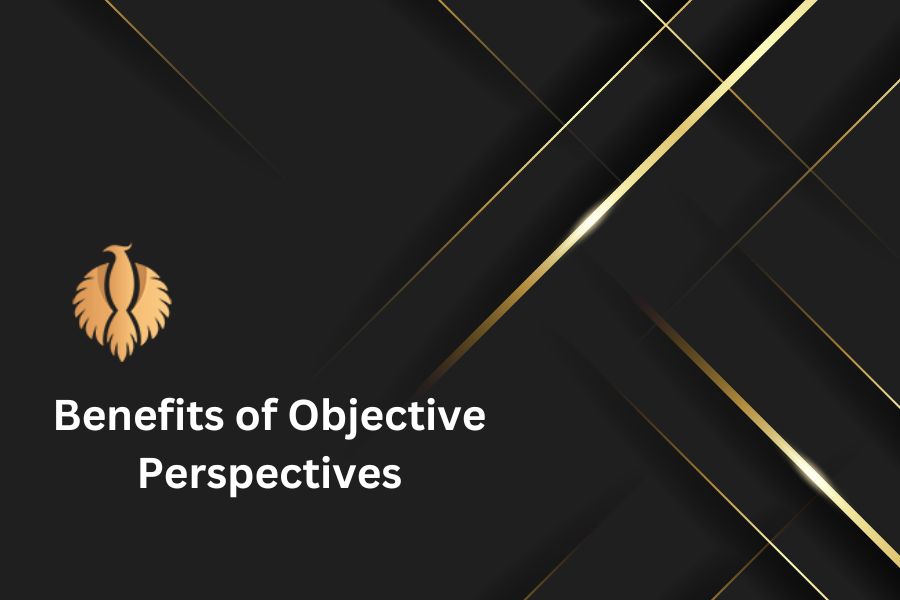
- Clarity and Consistency
- Unbiased Information: Objective perspectives provide factual, verifiable information that is free from personal bias. This is crucial in scientific research, journalism, and data analysis, where accuracy and neutrality are essential.
- Consistency: Objective data provides consistent benchmarks and standards. For example, objective measurements like test scores or performance metrics offer a stable basis for comparison and evaluation.
- Informed Decision-Making
- Evidence-Based Choices: Objective information helps in making well-informed decisions based on data and evidence rather than personal opinions. For instance, businesses use objective market research data to guide strategic planning.
- Problem-Solving Efficiency: Objective analysis can streamline problem-solving by focusing on measurable factors and clear criteria. For example, diagnosing a technical issue often relies on objective troubleshooting steps rather than personal opinions.
- Accountability and Transparency
- Traceable and Verifiable: Objective data is often easier to verify and audit, providing transparency and accountability. This is important in legal contexts, financial reporting, and scientific studies where clear evidence is required.
- Standardization: Objective criteria allow for standardization across different contexts and scenarios. For instance, standardized testing ensures that educational assessments are fair and consistent across different schools and regions.
Balancing Subjective and Objective Perspectives
In practice, leveraging both subjective and objective perspectives can lead to a more comprehensive understanding and better outcomes. Here’s how balancing these perspectives can be beneficial:
- Enhanced Decision-Making
- Combining Insights: Integrating subjective feedback with objective data can provide a fuller picture. For example, in product development, objective performance metrics can be complemented by subjective user feedback to refine a product.
- Balanced Evaluation: When evaluating a service or product, combining objective data (like performance metrics) with subjective impressions (like customer satisfaction) ensures a more balanced assessment.
- Improved Communication
- Holistic Understanding: Recognizing both subjective experiences and objective facts allows for clearer and more empathetic communication. This is important in negotiations, customer service, and interpersonal interactions.
- Contextual Clarity: Providing context through subjective insights can enhance the interpretation of objective data. For instance, understanding the user experience behind objective usage statistics can lead to more effective improvements.
- Comprehensive Problem Solving
- Integrated Approach: Addressing problems with both subjective insights and objective data can lead to more effective solutions. For example, in healthcare, subjective patient symptoms and objective diagnostic tests together provide a complete picture for treatment planning.
You might also enjoy: Congratulations On, Congratulations For, Congratulations To
Pros and Cons of Subjective and Objective Perspectives
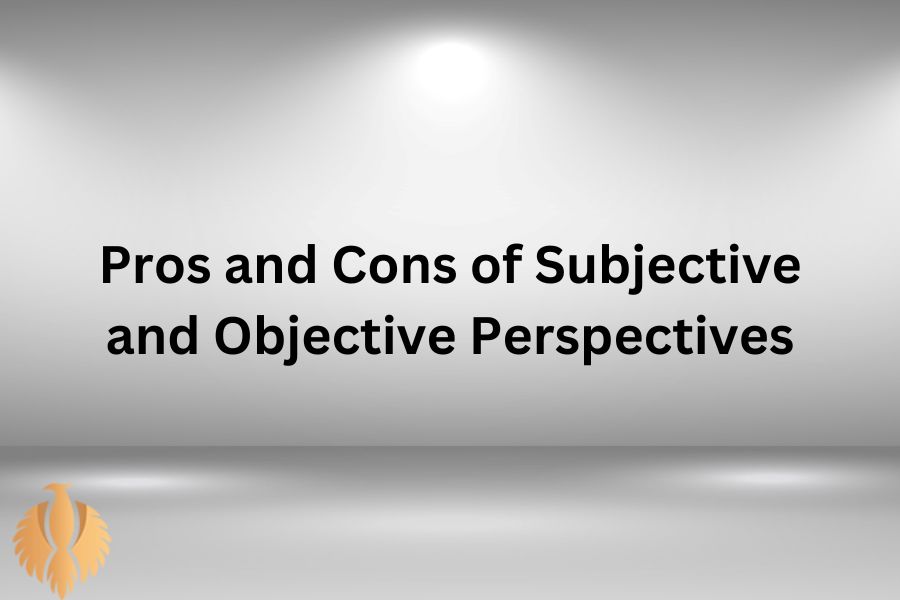
Understanding the pros and cons of subjective and objective perspectives can greatly enhance our ability to analyze, communicate, and make decisions effectively. Let’s break down the advantages and limitations of each perspective.
Subjective Perspectives
Pros ✅
- Rich Personal Insights
- Advantage: Subjective perspectives provide a deep understanding of individual experiences, preferences, and emotions. This is valuable in areas where personal connection and emotional resonance matter, such as art, literature, and personal relationships.
- Example: A book review that captures a reader’s personal emotional journey with the story offers insights that go beyond plot summary and analysis.
- Creativity and Innovation
- Advantage: Subjective viewpoints foster creativity and innovation by embracing diverse and unique perspectives. Creative fields like writing, music, and design thrive on personal expression and varied viewpoints.
- Example: An artist’s unique interpretation of a theme can lead to innovative and original works that might not emerge from a purely objective approach.
- Empathy and Relational Understanding
- Advantage: Subjective perspectives promote empathy and a deeper understanding of others’ feelings and experiences. This is crucial in counseling, conflict resolution, and building strong personal relationships.
- Example: Understanding a friend’s feelings about a difficult situation helps offer supportive and empathetic advice.
Cons ❌
- Potential Bias and Inconsistency
- Disadvantage: Subjective perspectives can be influenced by personal biases and emotions, which may lead to inconsistent or skewed views. This can affect the reliability of judgments and evaluations.
- Example: Personal favoritism can lead to biased assessments of performance or quality, such as favoring a friend’s work over a more deserving candidate.
- Lack of Universality
- Disadvantage: What is meaningful or valuable to one person might not be the same for another. This can lead to difficulties in reaching common ground or universal standards.
- Example: A movie that one person finds moving might be perceived as dull by someone else, making it hard to agree on its overall impact.
- Subjectivity Limits Objectivity
- Disadvantage: Relying solely on subjective opinions can sometimes obscure objective facts and hinder objective analysis. This can be problematic in fields where accuracy and consistency are essential.
- Example: Relying only on personal opinions about a product without considering objective performance metrics may lead to incomplete evaluations.
Objective Perspectives

Pros✅
- Clarity and Consistency
- Advantage: Objective perspectives are based on measurable and verifiable data, providing clear and consistent information. This is crucial for tasks requiring precision and standardization.
- Example: Objective data such as test scores or financial reports provide reliable benchmarks for evaluating performance.
- Evidence-Based Decision-Making
- Advantage: Decisions based on objective data are often more reliable and defensible because they are grounded in facts rather than personal opinions.
- Example: Medical treatments based on clinical trial results ensure that decisions are based on tested and proven effectiveness.
- Accountability and Transparency
- Advantage: Objective information provides a basis for accountability and transparency, making it easier to verify and audit. This is important in legal, financial, and research contexts.
- Example: Financial statements are subject to audits and must adhere to objective accounting standards, ensuring transparency and accuracy.
Cons❌
- Limited Personal Insight
- Disadvantage: Objective perspectives might lack the depth of personal experience and emotional nuance. This can be limiting in areas where personal experiences and feelings play a significant role.
- Example: A clinical assessment of a patient’s condition might not capture the full emotional impact of their illness.
- Potential for Overlooking Individual Needs
- Disadvantage: Strict adherence to objective criteria can sometimes overlook individual needs and unique circumstances, leading to a one-size-fits-all approach.
- Example: Standardized testing might not address the diverse learning styles and needs of all students.
- Lack of Flexibility
- Disadvantage: Objective data can be rigid and may not account for evolving contexts or changes in subjective experiences over time.
- Example: Relying solely on historical data for forecasting future trends may not account for new developments or shifts in public sentiment.
Balancing Subjective and Objective Perspectives⚖️
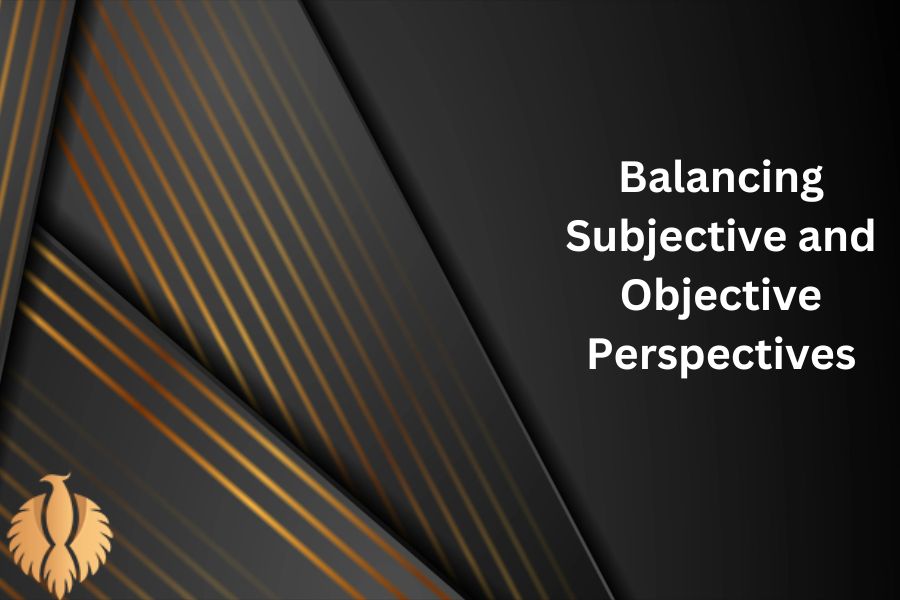
Both subjective and objective perspectives have their strengths and limitations. To achieve a well-rounded understanding and make effective decisions, it’s often beneficial to integrate both viewpoints:
- Combining Insights
- Example: In product development, combining objective data on performance with subjective user feedback can lead to better product design and user satisfaction.
- Enhancing Communication
- Example: When discussing issues in a team, providing both objective data and subjective experiences can lead to more comprehensive and empathetic discussions.
- Informed Decision-Making
- Example: In healthcare, integrating objective clinical data with subjective patient reports helps in creating more personalized and effective treatment plans.
You might also enjoy: I’ll Take Your Word For It – Grammar + Examples
Conclusion
Recognizing the benefits and limitations of both subjective and objective perspectives allows for more nuanced and effective decision-making.
By understanding when and how to apply each perspective, we can enhance our analysis, communication, and problem-solving abilities.
Balancing subjective insights with objective data often leads to a more comprehensive understanding and better outcomes in various contexts.

Hi, welcome to my blog! My name is Omid and I am thrilled to have you here! I am an English language teacher with 12 years of experience and hold multiple international certifications (TESOL, IELTS, TOEFL, PTE, CELTA). Additionally, I hold a PhD in Applied Linguistics with a specialization in Teaching English as a Second Language (TESL), which fuels my passion for teaching English and assisting others in mastering the language. To me, nothing is more rewarding than helping individuals enhance their English language abilities through various methods. So, let’s embark on this journey of learning English together.

